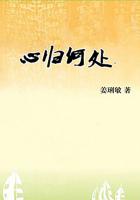Inasmuch, however, as the surface of the land cannot be increasedby industry, and the land cannot be utilised up to the measure ofits natural capacity, for want of means of transport, which (as weshowed in the preceding chapter) must remain imperfect in such astate of things owing to lack of intercourse; and as moreover themerely agricultural nation is mostly in want of those instruments,intelligence, motives to exertion, and also of that energy andsocial development which are imparted to the nation throughmanufactures and the commerce which originates from them, the mereagricultural population soon reaches a point in which the increaseof material agricultural capital can no longer keep pace with theincrease of population, and where consequently individual povertyincreases more and more, notwithstanding that the total capital ofthe nation is continually increasing.
In such a condition the most important product of the nationconsists of men, who, as they cannot find sufficient support intheir own country, emigrate to other countries.It can be butlittle consolation to such a country, that the school regards manas an accumulated capital; for the exportation of men does notoccasion return freights, but, on the contrary, causes theunproductive export of considerable amounts of material values(inthe shape of implements, utensils, money, &c.).
It is clear that in such a state of things, where the nationaldivision of labour is not properly developed, neither industry noreconomy can bring about the augmentation of the material capital(material enrichment of individuals).
The agricultural country is, of course, rarely quite withoutany foreign commerce, and foreign commerce, as far as it extends,also supplies the place of internal manufactures with regard to theaugmentation of capital, inasmuch as it places the manufacturer ofthe foreign country in commercial relation with the agriculturistof the home country.This, however, takes place only partially andvery imperfectly; firstly, because this commerce extends merely tospecial staple products, and chiefly only to those districts whichare situated on the sea-coast and on navigable rivers; andsecondly, because it is in any case but a very irregular one, andis liable to be frequently interrupted by wars, fluctuations intrade and changes in commercial legislation, by specially richharvests, and by foreign importations.
The augmentation of the material agricultural capital can onlytake place on a large scale, with regularity and continuously, ifa completely developed manufacturing power is established in themidst of the agriculturists.
By far the greatest portion of the material capital of a nationis bound to its land and soil.In every nation the value of landedproperty, of dwelling houses in rural districts and in towns, ofworkshops, manufactories, waterworks, mines, &c.amounts to fromtwo-thirds to nine-tenths of the entire property of the nation.Itmust therefore be accepted as a rule, that all that increases ordecreases the value of the fixed property, increases or decreasesthe total of the material capital of the nation.Now, it is evidentthat the capital value of land of equal natural fertility isincomparably larger in the proximity of a small town than in remotedistricts; that this value is incomparably larger still in theneighbourhood of a large town than in that of a small one; and thatin manufacturing nations these values are beyond all comparisongreater than in mere agricultural nations.We may observe(inversely) that the value of the dwelling houses and manufacturingbuildings in towns, and that of building land, rises or falls (asa rule) in the same ratio in which the commercial intercourse ofthe town with the agriculturists is extended or restricted, or inwhich the prosperity of these agriculturists progresses or recedes.
From this it is evident that the augmentation of the agriculturalcapital is dependent on the augmentation of the manufacturingcapital; and (inversely) the latter on the former.(2*)This reciprocal action is, however, in the case of the changefrom the agricultural state into the manufacturing state muchstronger on the part of manufacture than on the part ofagriculture.For as the increase of capital which results from thechange from the condition of the mere hunter to the pastoralcondition is chiefly effected by the rapid increase of flocks andherds, as the increase of capital resulting from the change fromthe pastoral condition into the agricultural condition is chieflyeffected by the rapid increase in cultivated land and in surplusproduce, so, in the event of a change from the agriculturalcondition into the manufacturing condition, is the augmentation ofthe material capital of the nation chiefly effected by those valuesand powers which are devoted to the establishment of manufactures,because thereby a mass of formerly unutilised natural and mentalpowers are converted into mental and material capital.Far fromhindering the saving of material capital, the establishment ofmanufactures is the first thing which affords to the nation themeans of employing its agricultural savings in an economicalmanner, and it is the first means by which the nation can beincited to agricultural economy.
In the legislative bodies of North America it has often beenmentioned that corn there rots in the ear from want of sale,because its value will not pay the expense of harvesting it.InHungary it is asserted that the agriculturist is almost choked withexcess of produce, while manufactured goods are three to four timesdearer there than in England.Germany even can remember such times.















